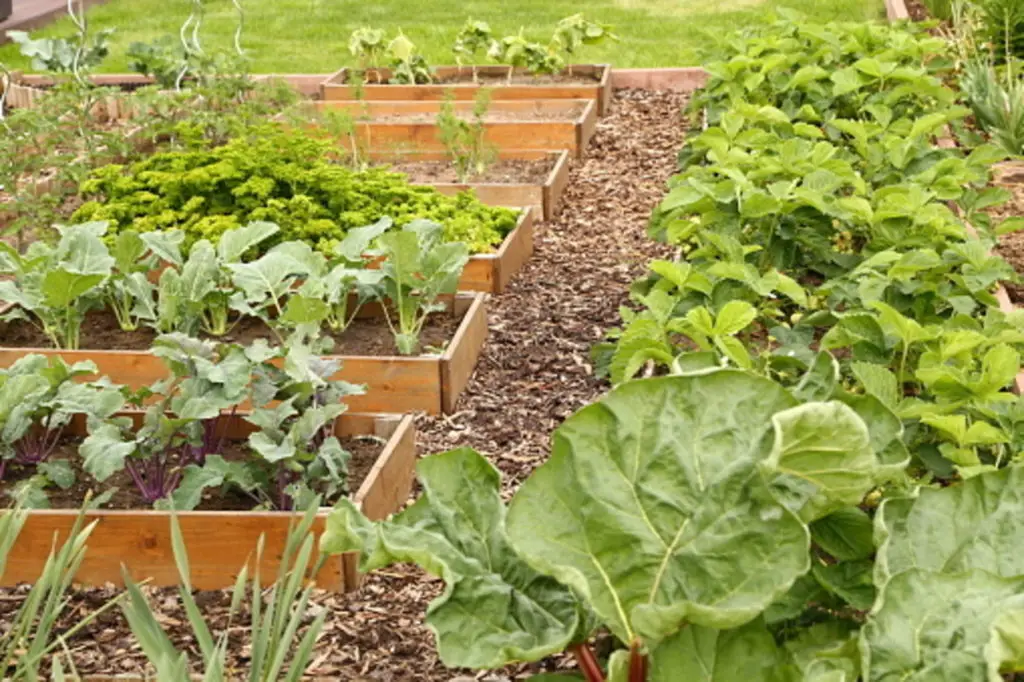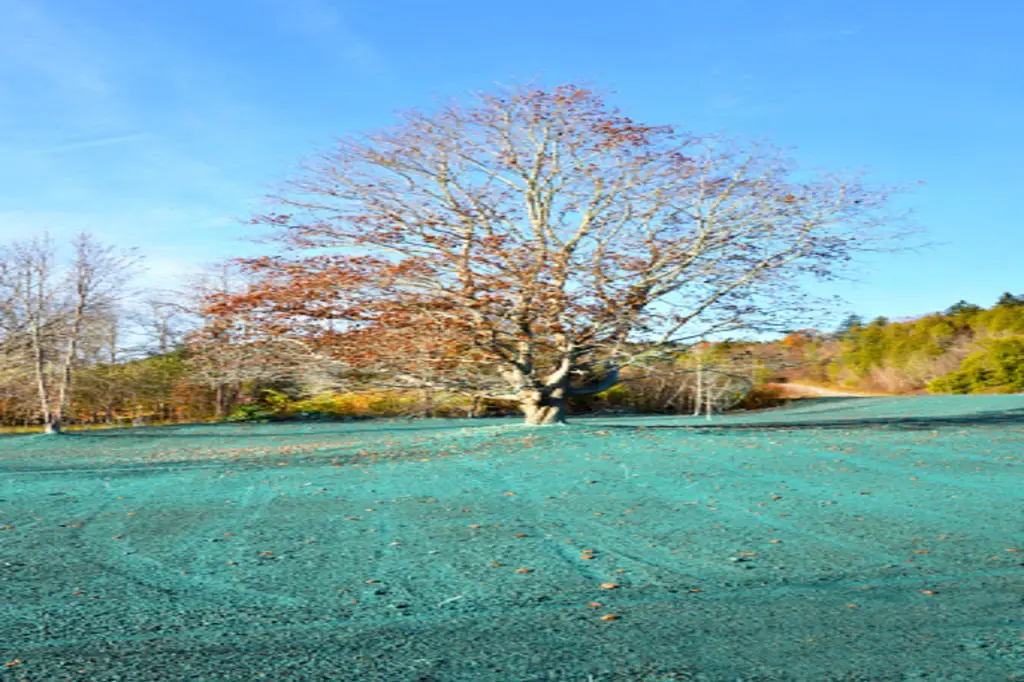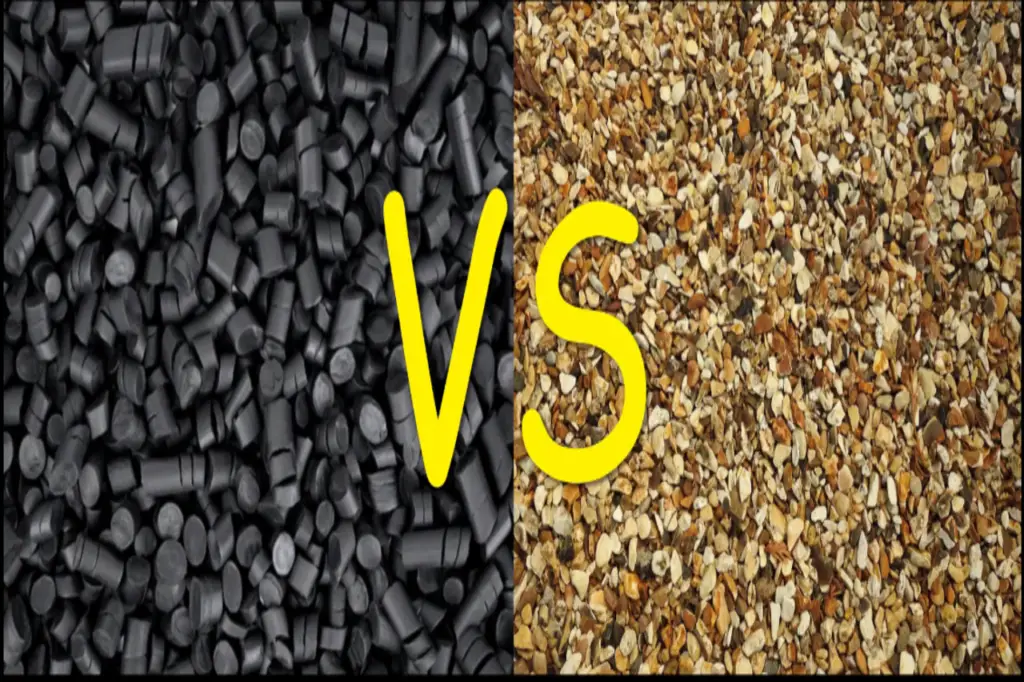Beyond question, mulch carries plenty of benefits not just for landscape beds but also for vegetable gardens. There are several types and varieties of mulch, and choosing the best mulch for your vegetable garden is crucial.
Before you lay any mulch on your garden, think about its suitability in the long run. Does it match your vegetables? Are the materials the perfect choice for the soil and the prevailing weather conditions?
With that said, high-quality mulch for a vegetable garden improves its fertility, buffers the soil temperature, conserves moisture, and ultimately covers the ground sufficiently to achieve these gains.
In this guide, you’ll learn the best options of vegetable garden mulches you can have on the market.
9 Best Mulches for Vegetable Garden
1. Blommer Cocoa Shell Mulch
Blommer Cocoa Shell mulch is a cocoa bean shell that comes in a very appealing brown color to improve the appearance of your vegetable garden. It leaves the soil smelling nice thanks to its natural sweet smell.
This mulch keeps the soil temperature warm in the cold months and raises it during summer. In addition, it allows water in your garden and retains moisture for use by plants.
Installing the Blommer cocoa shell is easy and takes less time. It’s light and spreads quickly and evenly across the bed, without packing.
Besides being aromatic, it also doesn’t bleach out, so you can enjoy its beautiful color for a long time. As the mulch ages, its color gets darker.
Pros:
- Holds moisture well
- Smells nice
- Great color appearance
- Does not become soggy
Cons:
- You need plenty of it to cover a large area
- A bit light and is easily blown away by the wind
- Potential for growth of fungus and mold
Verdict:
Blommer Cocoa Shell Mulch is your go-to vegetable garden mulch if you love aromatics and an elegant-looking garden.
2. Cedar Mulch Granules
While it comes as a safe and high-quality product, Cedar mulch granules hail from the natural cedar trees. It’s an organic mulch that effectively covers the garden from extreme weather and smothers weeds. However, it also delivers a massive line of gains.
Primarily, cedar mulch granules are great for protecting your vegetable plants from destructive insects such as mosquitoes, mites, ants, fleas, and other bugs. It repels these bugs for up to 8 weeks once installed.
The mulch is organic and retains beneficial insects like butterflies and bees. The pleasant smell from this mulch is attractive both to these insects and humans.
This product is applied in the early stages of vegetable growth. If you have it after your vegetable plants get infested, it might not help with insect repulsion.
Pros:
- Safe to use
- Repels harmful insects
- Covers the ground to preserve moisture
- Improves soil fertility
Cons:
- Not practical for harmful insects if you apply it late
- Its scent can fade away just after a few days
Verdict:
The cedar mulch granules are used as a mulch cover and an effective insect repellant. It’s that versatile.
3. EZ Straw Mulch 2.5CF
With the EZ Straw Mulch, you have a reliable, high-quality premium processed straw mulch with a tackifier for bonding the straw together. Thanks to this tack, the mulch stays longer even in strong wind and surface run-off when applied to the garden.
The 2.5 cubic ft. bag works a lot of ground up to 500 square feet. Spreading this mulch is effortless because it’s finely processed but make sure you follow the application instructions closely.
Moreover, the straw mulch keeps your soil warm and helps to retain moisture. Many gardeners are satisfied with how it also suppresses the weeds to allow plants to grow healthy and fast.
EZ straw mulch can work well on a steep slope as it’s not easily swept by running water. Yet, it holds nicely in muddy winter yards since it keeps mud tacked.
Pros:
- Covers ground well
- Applying the mulch is easy
- Suppresses weeds
- Sticks together well
Cons:
- A bit pricey
- Bad results if you don’t follow application instructions
- It may contain some weed seeds
Verdict:
If you want an easy-to-use and high-performance mulch for your vegetable garden, this is your perfect option.
4. Dr. Earth All Purpose Compost
As the name suggests, Dr. Earth All Purpose Compost is a mulch that serves many purposes. Whether it’s your vegetable garden, flower beds, lawns, or your tree beds, Dr. Earth All Purpose Compost provides the much-needed benefits of cover, warmth, and moisture retention.
Dr. Earth contains various nutrients, valley-grown alfalfa meal, green-fed earthworm castings, and cold water kelp meal. All these are organic nutrients that make the mulch 100% natural.
The mulch’s rich, dark properties turn on a fluffy appearance, which looks fantastic. It greatly amends your vegetable garden soil, improving its structure and adding more nutrients into the soil. The result is not just healthier plants but also increased yield.
Even though you may find a few pebbles in your bag of Dr. Earth, it doesn’t cause much of a fuss in the garden.
Pros:
- Can work on a variety of projects
- High-quality mulch
- Nice, fluffy appearance
- Rich in nutrients
Cons:
- A bit expensive
- It may contain some stone pebbles
Verdict:
Overall, this is an excellent organic mulch with benefits to vegetable gardens, flower beds, shrubs, tree landscape beds, and lawns.
5. SpongEase Coconut Coir Compressed Block
SpongEase Coconut Coir Compressed Block is your ideal mulch whenever you’re growing potted vegetables on your balcony or in your garden. The mulch comes from pith and coconut husk fiver with excellent water absorption and retention qualities.
You can be sure that your plants will have enough moisture to grow healthy. It’s compostable, hence a solid option for soil amendment.
StrongEase Coconut Coir doesn’t attract harmful bugs around easily. Its pH is neutral because it undergoes a washing process to drain excess salts. At this neutral pH, you can grow different kinds of plants with it.
Remember, it doesn’t come with nutrients like other types of mulches. The mulch consists of microscopic tubes. These drain excess water and allow proper oxygen flow to reach plant roots.
Pros:
- Neutral PH suitable for many plants
- Light and easy to work on
- Provides enough potting medium
- It doesn’t spread disease and harmful insects
Cons:
- It takes time to absorb water and expand
- Has no nutrients
Verdict:
SpongEase Coconut Coir is an excellent mulch that you can use as a perfect growing medium for potted vegetable gardening.
6. Grow Organiks Coconut Coir Husk Chips
If you’re looking for a versatile mulch for different jobs on your farm, the Grow Organiks Coconut Coir Husk Chips is an ideal candidate. You can have this mulch over your vegetable garden but also in other applications such as potted soil mixes for indoor plants.
The mulch provides the perfect security to your plants. Offering great cover on the ground, it cuts off light and moisture, discouraging weed seed germination.
Accordingly, Grow Organiks Coconut Husk mulch holds water moisture consistently well for your vegetables. Other benefits that plants gain from this mulch include warmth and the addition of nutrients to the soil after the mulch decomposes.
Before using this product, you need to apply water to it and leave it for a while. The block expands, and now you can use a tool to separate and spread on your garden.
Pros:
- It can be used for different applications
- 100 percent organic
- Very reliable
- Price is affordable
Cons:
- It takes a bit of time to expand when water is applied
Verdict:
Overall, Grow Organiks Coconut Husk mulch is a proper organic mulch that holds water well for vegetables and offers better drainage for potted plants.
7. FiberDust CoCo Mulch
FiberDust CoCo Mulch is a potentially top-level mulch for your vegetable garden that comes in a 5-kg compressed block. FireDust CoCo Mulch is mostly fibers made from crushed coconut husks, and it’s heavier, hence a good fit for an inclining ground.
Whether using it on raised vegetable beds, pots, flower beds, or other landscape beds, FiberDust CoCo mulch contains lignin that outlasts many other different types of mulch. It can stay intact for three years running.
The mulch provides a beautiful texture, and once you spray water on it, it turns into a fluffy mass. Another advantage it brings to your soil is more tilth, which is gain to your vegetables.
Pros:
- Looks beautiful
- Doesn’t float
- Long-lasting mulch
- Adds tilth to the soil
Cons:
- A bit pricey
- Not great for weed suppression
Verdict:
FiberDust CoCo mulch is an excellent mulch for use in raised vegetable gardens.
8. Hull Farm 50150 Cocoa Bean Shell Mulch
Made from the outer shells of the cocoa bean, Hull Farm Cocoa Bean Shell Mulch is a robust and solid mulch that offers vegetable gardens profound benefits. It’s fully organic, smells aromatic chocolate, and gives a beautiful, natural sight.
The Hull Farm Cocoa Bean Shell mulch does a good job covering and protecting the soil well. It doesn’t give in to the vigors of wind or run-off from rain showers.
The mulch isn’t like the regular mulch that you must remove after some time. You only need to turn it into the soil to add nutrition and improve your vegetable yields. ‘
Beyond that, this mulch is a great weed suppressor and retains enough moisture for your plants in the garden.
Pros:
- The natural aromatic smell is great
- Suppresses weeds
- Conserves moisture better
- Great color
Cons:
- Heavy rains can cause mold to spread
Verdict:
Generally, this is a true-to-type mulch with many benefits to plants.
9. Coast of Maine OMRI-Listed Tomato and Vegetable Plant Potting Soil
There is no doubt that your vegetables would love an extra pinch of fertilizer to take up. Coast of Maine OMRI-Listed Tomato and Vegetable Plant Potting Soil is a mulch rich in diverse nutrients and ingredients.
From peat moss and lime to lobster and crab compost, it’s almost evident that your plants will have all the valuable nutrients they need. You can use the mulch as a medium for potted plants or apply it directly in your outdoor vegetable garden.
It has the correct density for proper soil water retention and drainage. Moreover, it has a nice texture and smells like compost. This mulch is easy to apply as it pours out pretty effortlessly.
Pros:
- Rich in nutrients
- Easy to work on
- Plants grow fast
- Great water retention and proper drainage
Cons:
- It’s prone to insects
- A bit pricey
Verdict:
This mulch is worth every coin you spend on it. It’s highly rated among many vegetable gardeners in the country.
Benefits of Mulch in Your Vegetable Garden
Mulch gives your plants a host of benefits. Let’s have a look at them.
1. Weed suppression
Some mulches are excellent weed suppressors. They form a solid layer on the surface enough to smother weeds by preventing light and water entry.
2. Soil insulation
During winter, plants experience winter stress. Mulch can increase the temperature in the soil and provide warmth to plants. If you use dark-colored mulch in winter, your vegetables will love it.
3. Moisture retention
Moisture retention is yet another essential factor for the proper growth of plants. Mulch prevents excess evaporation from the soil and reduces drought-induced problems in plants.
4. Minimal run-off
Mulch prevents excessive run-off on the garden surface. Therefore, soil in the garden remains whole and intact to support the growth of plants.
5. Improved soil fertility
Biodegradable mulch like straw and other organic materials decompose to recycle nutrients into the soil after some time. If you mulch correctly, your vegetable yields can improve by 50%.
Types of Mulches for Your Vegetable Garden
There are two types; organic and inorganic mulches. Organic mulches are the leaves and pine needles that fall from the trees and other plants.
Compost is also an organic mulch. Organic mulches are great for vegetable growing because, after they decompose, nutrients are released into the soil for plants to use.
Do you want to improve the value of your garden? Well, organic mulches are the way to go. As for the inorganic mulch, they consist of landscape fabrics, black plastic, and rocks or stones.
Here is a list of the different organic and inorganic mulches for your vegetable garden:
1. Compost
For gardeners with a long-term goal to increase the vegetable yield and amend the soil in the garden, compost is the perfect option. It improves soil structure and overall quality.
Compost is made by composting different materials like grass clippings, hay, leaves, paper, fresh vegetable trimmings, and other cuttings. You leave them for a certain period to decompose and form compost.
2. Grass Clippings
Grass clippings that are dried and free of bugs and disease are great for vegetable gardeners. These clippings cover the soil well, and when they decompose, the soil receives extra nutrient supplies.
3. Straw
Straw is an excellent resource for mulching vegetable plants during winter. It provides insulation benefits to the soil, warming it and helping plants survive winter stress. High-quality straw from a reliable source does the best job.
4. Pine needles
Pine need mulch can be an excellent cover for vegetables such as celery, carrots, tomatoes, potatoes, and cauliflowers. But, use them only on acid-loving plants as these needles drop soil pH.
If you arrange pine needle mulch well, it interlocks and becomes stable, resisting weather elements like wind and quick surface run-off.
5. Leaves
Depending on what you want to achieve in your vegetable garden, you can either have partially decomposed leaves or coarsely shredded dry leaves.
But generally, leaves provide a concrete cover on a vegetable garden, preventing weed growth while improving soil structure and water retention.
6. Cocoa Hulls
Cocoa hulls improve your garden appearance; hence they’re suitable decorative materials. However, they provide lovely cover to the soil.
They smell chocolatey, creating a soothing environment around the garden. Cocoa hulls are also rich in nutrients.
7. Black Plastic
If your main aim is to control weeds effortlessly in your garden, black plastic does the best job. Besides, it’s a good match for heat-loving veggies as it significantly warms the soil.
To use this plastic, make sure you spread it first on your garden and punch holes for planting your vegetable seeds or plants.
These holes are also vital for air entry for root use, water, and nutrient penetration into the soil. Remember that plants need these factors to grow healthy and strong for the best yields.
Final Thoughts
The best mulch for a vegetable garden achieves four primary purposes; it protects the soil, conserves soil moisture, warms the soil, and adds nutrients into the soil.
There are various mulches on the market, but choosing the correct mulch for your vegetable garden is crucial. If you make a wrong choice, your plants will likely fail, which is not an option for you.
You’d better take your time to assess the different mulches I already discussed in the review above and make a proper decision. If anything, follow the included guide to check which type of mulch could match your needs.


